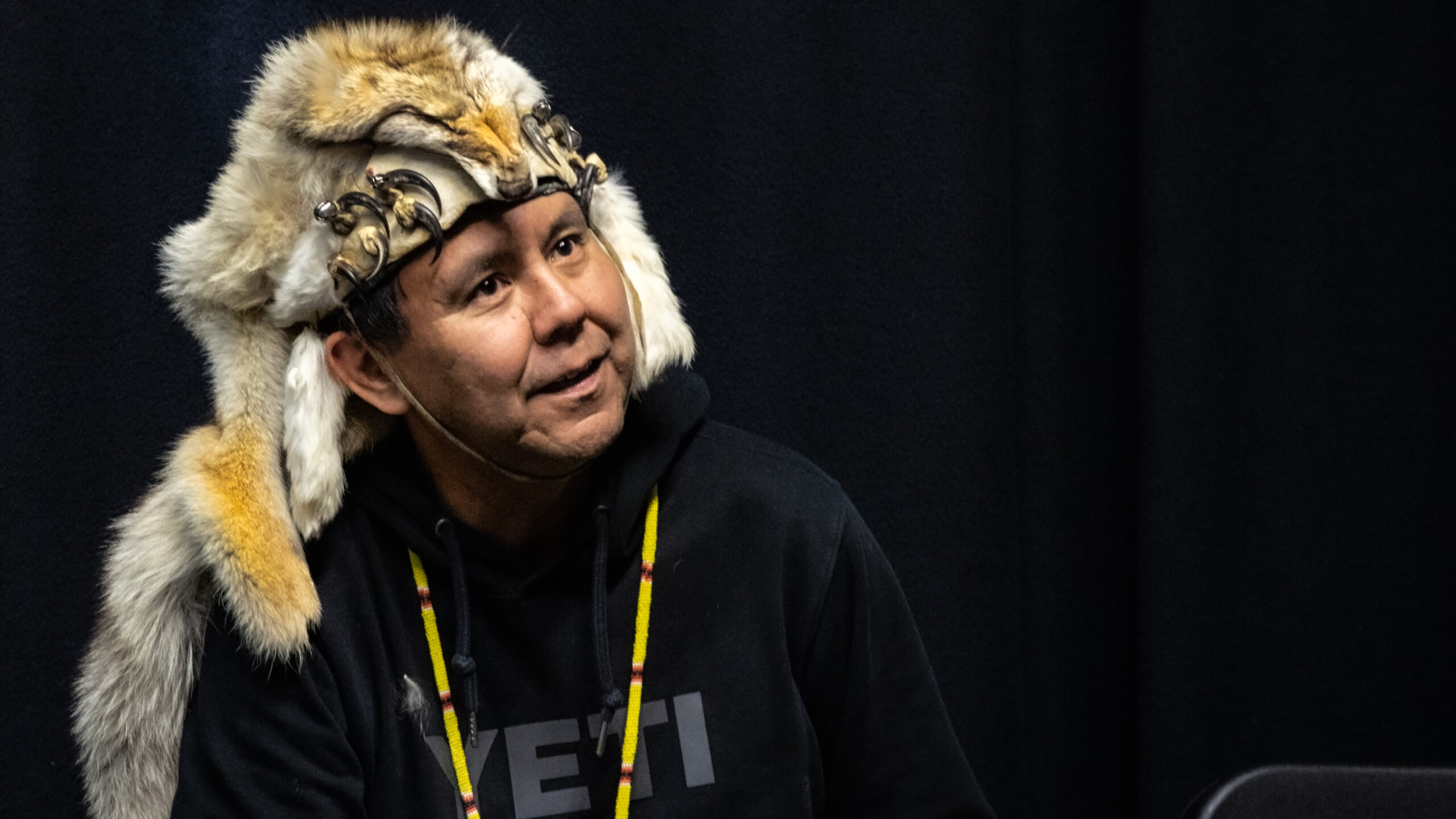Early last week, TRU’s Alumni Theatre was filled with students, faculty, and community members from the greater Kamloops area who gathered to experience tales from Indigenous storyteller Kenthen Thomas. The event, split into two storytelling sessions, lasted just under three hours and offered guests the chance to witness the Secwépemc nation’s rich storytelling traditions.
Thomas, a storyteller and educator, has been telling stories since his youth. A member of the Secwépemc nation, Thomas was born in Kamloops and raised in Salmon Arm. It was during his time in Salmon Arm that he connected deeply with his roots, helping him “reconcile and go beyond who [he was] meant to be.” His grandmother, elder Mary Thomas, trained him in the traditional Secwépemc art of storytelling. Today, Thomas shares his gift in cities across British Columbia and beyond; his ‘Stsepetkwll’—or “Legends That Teach”—is an important tool for both education and entertainment.
With a frame drum and drumstick in hand, Thomas spent the next few hours transforming the theatre into a vivid world of anthropomorphic animals and mythical adventures. As customary in Secwépemc storytelling traditions, Thomas began each story with the phrase, “A long, long, long time ago”. His voice, reverberating loudly across the room, was supported by the intense beating of his drum. Everything about his performance—from the body movements to the practised changes in his voice—drove the tale forward. In no time, the crowd was hanging on to his every word, alive with laughter and surprise, cheering loudly at each story’s conclusion.
Though undeniably engaging, these ‘Stsepetkwll’ are also important learning lessons, full of moral and cultural wisdom.
“These stories aren’t just entertainment,” Thomas said in a piece for Indigenous Education. “If they want entertainment, they can hire themselves a magician, or a clown, or a DJ.”
More than simply a performance, Thomas’ stories serve as lenses through which people may reflect on themselves, their relationships, and the world around them.
In the second session, Thomas shared the story of The Suckerfish, a tale about a beautiful suckerfish who tried to outshine the moon by leaping over it. After jumping too high and at too sharp an angle, the fish fell to the earth and scattered into several tiny pieces. All animals of the community came together, giving something—whether it was parts of their bodies, their time, or their wisdom—to put the suckerfish back together as best as they could. But the suckerfish was ashamed of its new, less beautiful appearance and now hides at the bottom of the lake.
“He forgot all of the helpers,” Thomas said. “He forgot all who gave him something small, little, or advice or kindness. He forgot to honour himself for being able to reconcile and go beyond. And he carries with him the shame and agony of being a Suckerfish at the bottom of the lake.”
The moral of the story, Thomas told the audience, was to never forget those who offered you assistance, no matter how little. “I truly believe that the true miracles in our [lives] are the ones that are put in front of you,” Thomas said. “[Those people] who look at you as a human and go, ‘You need my help, I have the capacity to help you, and I’m going to help you.’ Keep in mind the helpers in your life.”
With over 30 stories in his arsenal, Thomas sees his position as a knowledge sharer as one of deep cultural value and responsibility.
“If you know a story, it is your obligation to share it,” he said. “And if you know our culture and traditions, it is your responsibility to pass them on.” He encourages those present to continue in his work, sharing the stories they’ve heard and carrying them forward for future generations.
Thomas expressed hope that these stories will not only endure but will thrive in the hands of future generations.
“I am just the knowledge-sharer,” he said. “And I do this because the true owners of the knowledge are the people that are yet to come. And that’s the unborn, the future generations, the children and high-schoolers. They’re going to be the ones, in ten or twenty years, sharing this knowledge with the next generation.”
The event demonstrated the power of stories; how they resonate, connecting people across space and time, preserving and carrying on culture, and interrogating truths about us. Kenthen Thomas’ performance demonstrated why we all tell stories, and why storytelling will never be a thing of the past.

